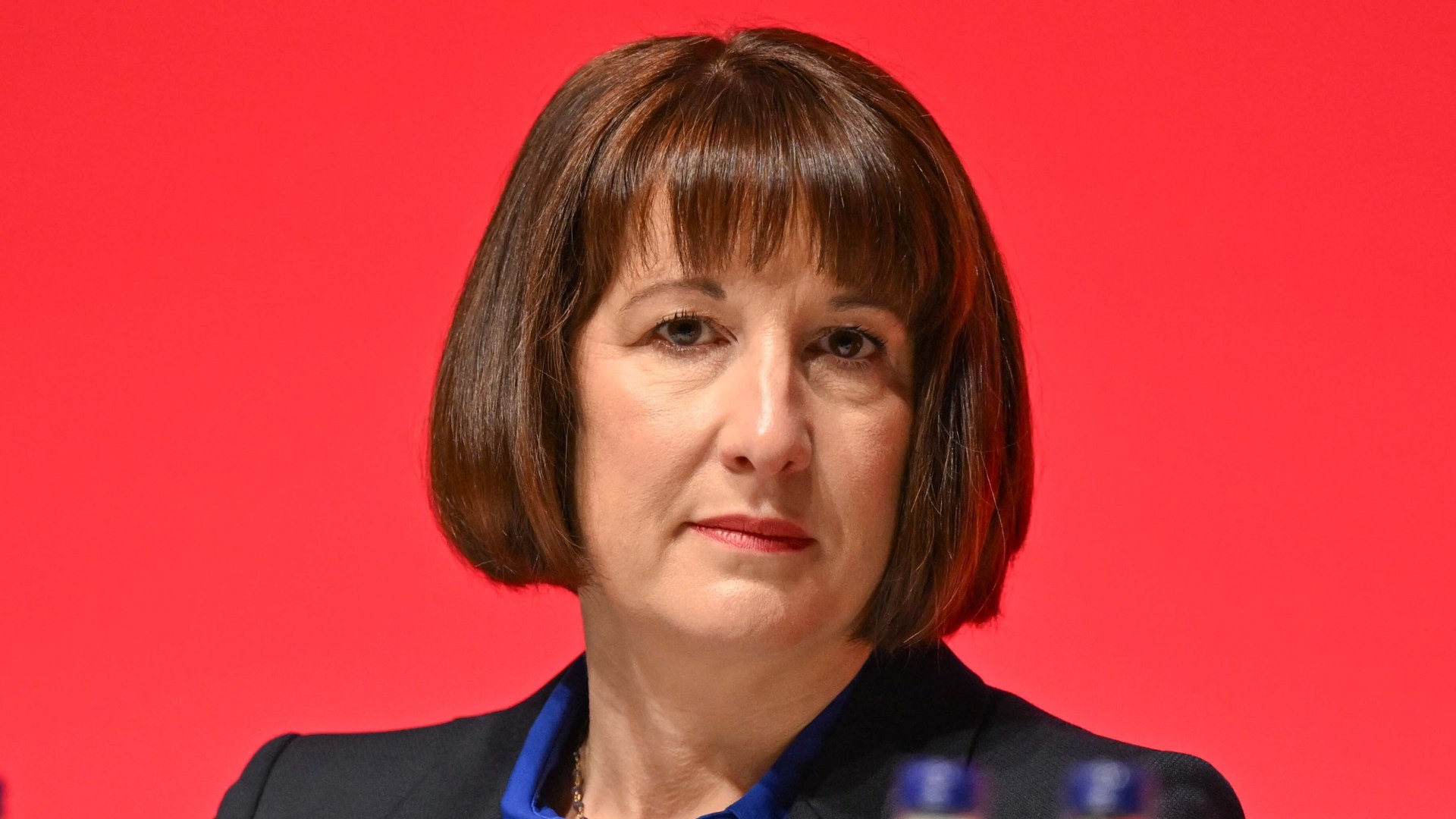Money
Chancellor needs to raise taxes by whopping £25BILLION in Autumn Budget to avoid austerity

BRITS could be slapped with a £25 billion tax bill if Labour wants to avoid austerity, leading economists have warned.
The Institute for Fiscal Studies has claimed the Chancellor will have to dig deep into taxpayers’ pockets if she wants to keep spending promises without cutting public services.
In their annual analysis, they argue even changing the debt rules won’t help, leaving the Chancellor facing what could be “the most consequential” Budget since at least 2010.
The new Labour government has already pledged in its manifesto to increase government budgets by £5bn and is spending £9bn to settle disputes with the public sector.
If Labour sticks to the spending plans set by the previous government in 2021, it would see a £17bn surplus.
But those plans are considered wildly unrealistic and would involve real term cuts to unprotected budgets.
With little support for more public spending cuts, the Chancellor could shield budgets from inflation, leaving her with a £1bn surplus.
But if she decides to maintain spending as a share of national income—which accounts for population growth—she’d face a £16bn deficit.
Adding this £16bn shortfall to the already promised £9bn in tax hikes would push the total tax increase to £25bn, driving the tax burden to a generational high.
IFS director Paul Johnson said: “The new Chancellor is committed to increasing investment spending, and to funding public services. To do so, she will need to increase taxes, or borrowing, or both.
“Taxes are at an all-time high, and she is tightly constrained by her pledges not to raise the main rates of income tax or corporation tax, or to increase National Insurance or VAT at all.
“The temptation then is to borrow more, perhaps changing the definition of debt targeted by the fiscal rules.
“But, given her pledge to balance the current budget, that would not free up additional resource for day-to-day spending and in any case is not risk-free given the dual deficits – that is, both budget deficit and current account deficit – being run by the UK.”
A Treasury spokesperson said: “It’s right to say that we have inherited a tough financial position, but we won’t let the challenges of the past define our future.
“Despite uncovering a £22 billion black hole in our public finances we are focused on making this the most pro-growth Treasury in history, built on the rock of economic stability, including robust fiscal rules that were set out in the manifesto. That is how we will fix our public services and deliver on the promise of change.”
A Treasury spokesperson said: “It’s right to say that we have inherited a tough financial position, but we won’t let the challenges of the past define our future.
“Despite uncovering a £22 billion black hole in our public finances we are focused on making this the most pro-growth Treasury in history, built on the rock of economic stability, including robust fiscal rules that were set out in the manifesto. That is how we will fix our public services and deliver on the promise of change.”
A Treasury spokesperson said: “It’s right to say that we have inherited a tough financial position, but we won’t let the challenges of the past define our future.
“Despite uncovering a £22 billion black hole in our public finances we are focused on making this the most pro-growth Treasury in history, built on the rock of economic stability, including robust fiscal rules that were set out in the manifesto. That is how we will fix our public services and deliver on the promise of change.”
A Treasury spokesperson said: “It’s right to say that we have inherited a tough financial position, but we won’t let the challenges of the past define our future.
“Despite uncovering a £22 billion black hole in our public finances we are focused on making this the most pro-growth Treasury in history, built on the rock of economic stability, including robust fiscal rules that were set out in the manifesto. That is how we will fix our public services and deliver on the promise of change.”
A Treasury spokesperson said: “It’s right to say that we have inherited a tough financial position, but we won’t let the challenges of the past define our future.
“Despite uncovering a £22 billion black hole in our public finances we are focused on making this the most pro-growth Treasury in history, built on the rock of economic stability, including robust fiscal rules that were set out in the manifesto. That is how we will fix our public services and deliver on the promise of change.”
Predictions for the Autumn Statement
The Sun’s Head of Consumer Tara Evans reveals the top predictions for the Autumn Statement:
Winter Fuel Payments
Chancellor Rachel Reeves has already announced that Winter Fuel Payments will be limited to those receiving pension credit and certain benefits. The benefit is worth up to £300 per year and currently is available to everyone over state pension age and those on certain benefits.
No rises to some taxes
Keir Starmer promised there would be no rises to National Insurance, Income Tax, Corporation Tax or VAT as part of Labour’s manifesto in the election race.
Inheritance Tax
It has been predicted that the Chancellor Racheal Reeves will make changes to inheritance tax rates or thresholds. One suggestion is the potential shortening of the gift period before death for tax exemptions.
Pensions
Pensions featured very high up in the King’s Speech, was this a hint at how high on the agenda it will feature in the budget? Experts say there are a number of options, including reintroducing the lifetime allowance cap. Ms Reeves has previously campaigned to reduce the tax relief that higher earners get on their pensions and to introduce a flat rate of 33% instead. Another possible option is changing the rules around pensions and inheritance tax.
Capital Gains Tax (CGT)
There is speculation that the £3,000 tax-free allowance could be scrapped or there may be an extension of CGT to other assets.
Business Rates
There are rumours of reforms to support small businesses, possibly basing rates on land value.
Fuel Duty
Possible rise in fuel duty, reversing the freeze since 2011 and impacting household costs. The Sun has backed drivers as part of its Keep It Down campaign since the start of 2011.
Money
I won £25million lottery jackpot but only took home a fraction because of promise I made years ago

A HOSPITAL COOK won £25 million in the lottery, but only took home a fraction of the winnings due to a promise she’d made years previously.
Julie Amphlett was working at Nealth Port Talbot Hospital, Wales when she heard the news of her giant EuroMillions win in 2017.
However, she had previously agreed to divide any winnings with five other people – meaning she only came away with just over £4.2 million.
The six women were part of a work syndicate called The Catering Girls – all colleagues at the hospital.
They had been playing the Euromillions for six years before their win.
Despite losing out on a large proportion of the jackpot, syndicate leader Julie was delighted with the result, as the six colleagues all quit their jobs and jetted off on a luxury holiday to Las Vegas.
Julie and fellow syndicate members Louise Ward and Sian Thomas reunited this week to celebrate 30 years of the National Lottery.
Along with other lottery winners, the women prepared a special lunch for guests at the Cegin Hedyn community café.
Julie said: “It’s great to be back in the kitchen with the girls, it takes us right back to those years we spent in the hospital kitchen before our incredible win.
“And it’s nice to be using our skills for such a deserving project.
“The idea that everyone, from all walks of life, can come together and share a meal is so important within the local community.”
The women prepared food and mocktails, and presented a gift and thank you note to those involved in the success of the café.
Since opening, Cegin Hedyn has served over 10,000 meals to the local community.
Dave and Sarah Williams, Wales’ most recent National Lottery millionaires, also joined The Catering Girls in the kitchen.
Dave said: “Since that incredible moment when our numbers came up I’ve pinched myself quite a bit, and today is no different.
“Firstly, it’s amazing to meet all these other lucky winners – I didn’t realise there were so many in Wales! – and it’s also been great to see where the Good Cause funding goes to, this project is doing some truly amazing things for the community in Carmarthen.
“Our lives have changed so much for the better since our winning moment.
“We moved into a new home where Trevor, our very boisterous dog, can finally wear himself out with his zoomies, and Sarah and I are taking things easy for a bit before we plan our next adventures, and if I know Sarah, that might well be deciding what pet will be joining our family next.”
The news comes as another lottery syndicate in Australia descended into a bitter feud.
Alan Way sought legal action against Mark Peter Bowling, 76, and Moya Posa, 89, over claims he was cut out of the syndicate’s massive £3 million winnings.
What is a lottery syndicate
A lottery syndicate is a group of lottery players who pool their resources to buy multiple tickets, increasing their chances of winning. The costs and winnings are shared among all members. Syndicates can be formed online or with friends, family, or colleagues.
Setting up a syndicate
- Set up a syndicate agreement to avoid disputes and tax issues. This will outline the structure and management of the syndicate.
- Appoint a syndicate manager
What are the syndicate manager’s responsibilities?
- Maintain the syndicate agreement
- Ensure each player has paid for their tickets
- Purchase tickets and check for prizes
- Collect and distribute winnings among members
How many members can you have and how many tickets can you buy?
- There’s no limit to the number of members or tickets
- More tickets increase winning chances, but also make management harder and winnings smaller per member
Prize distribution
- Winnings are paid to the syndicate manager, who then distributes them
- Online syndicates automate this process
Legality
- Lottery syndicates are legal and a fun way to enhance your chances of winning
- Ensure a syndicate agreement is in place for offline groups, or join an online group for secure and automated management of tickets and winnings
Money
BareRock launches counselling and wellbeing programme for members


Professional Indemnity Insurance (PII) provider BareRock has launched a counselling and wellbeing support programme for its advice firm policyholders.
The programme aims to support the mental health and wellbeing of individuals within BareRock’s club member firms who are dealing with the strain of high-stress complaint situations, by covering the costs of professional counselling.
Under the new initiative, BareRock will fund up to 10 one-hour counselling sessions per claim, subject to a £2,000 cap, with no policy excess payable by the club member firm.
This is designed to help business owners, senior leaders and employees who often find themselves directly involved in managing complex and pressure-filled complaints while juggling multiple responsibilities in highly regulated businesses.
The initiative will be incorporated into BareRock’s offering at no extra cost during the last quarter of 2024.
It will be available to existing and new policyholders.
The news was announced on World Mental Health Day today (10 October).
BareRock CEO and founder Jonathan Newell said: “We are constantly seeking ways to enhance our offering and provide meaningful value to our club members where it’s needed most.
“By offering compassionate support on a human level, alongside technical and strategic assistance during complaint situations, we can help our club members better manage the emotional and mental toll of dealing with stressful complaint situations.
“This mental health and wellbeing support is a great demonstration of our commitment to our customers and to the FCA’s vulnerable customers guidance.”
BareRock’s counselling services aim to support individuals as they navigate the challenges of their roles.
The programme helps develop strategies for better stress management, work-life balance and mental-health prioritisation.
Corporate Personal Wellbeing (CPW) is BareRock’s preferred partner in delivering these professional counselling sessions.
CryptoCurrency
Argentina overtakes Brazil in crypto inflows — Chainalysis


Argentina’s stablecoin market is one of the largest in the world in terms of share of stablecoin transactions, beating the global average by 17%.
Money
Exact date Winter Fuel Payment letters will land on doormats – will you get £300 bill boost?

THOUSANDS of households will soon receive letters confirming their entitlement to a £300 cash boost.
The Winter Fuel Payment is a state benefit paid once a year to pensioners to help cover the costs of heating during the colder months.
It was avaible to everyone aged 66 and over but recent cuts made by Chancellor Rachel Reeve mean only those on means-tested benefits, such as Pension Credit, will now get the help.
How much you recieve also depends on what year you were born.
For example, if you live alone you will get £200 if you were born between September 23 1944 and September 22 1958.
But you will get £300 if you live alone and were born before 23 September 1944.
If you and your partner jointly claim any of the benefits, one of you will get a payment of either:
- £200 if one or both of you were born between September 23 1944 and September 22 1958
- £300 if one or both of you were born before September 23 1944
The Department for Work and Pensions (DWP) will begin sending letters to pensioners who quailfy for the payment in England, Wales and Northern Ireland. by the end of October.
For customers in Scotland the target date for issuing the letters will be in November.
All quailfying pensioners across the UK should recieve their payment of either £200 or £300 by November or December.
The money is paid automatically in your bank account.
If you do not get a letter or the money has not been paid into your account by January 29 2025 it is recomennded you get in contact with the Winter Fuel Payment Centre.
This is operated by the DWP and can reached on the telephone by calling 0800 731 0160.
You can also send a letter via the psot to Winter Fuel Payment Centre. Mail Handling Site A, Wolverhampton, WV98 1LR.
When you contact the payment centre, you’ll need to tell them your personal details like:
- Your name
- Your address
- Your date of birth
- Your National Insurance number
Who is eligble for the Winter Fuel Payment
You will receive the Winter Fuel Payment if you are aged 66 or above and on any of the following benefits.
- Pension Credit
- Universal Credit
- income-related Employment and Support Allowance (ESA)
- income-based Jobseeker’s Allowance (JSA)
- Income Support
- Child Tax Credit
- Working Tax Credit
You may also recieve the benefit if you are a UK pensioner who lives abroad.
A partner below the state pension age may also be eligible for the £300 payment if they live with a partner who is over state pension age and they jointly claim benefits.
It is worth noting that around 800,000 older people risk missing out on the £300 Winter Fuel Payment because they have not first registered for Pension Credit.
The benefit is a weekly payment from the government to those over the state pension age who have an income below a certain level.
If your claim is successful then the benefit will top up your income to £218.15 a week if you are single, or £11,343.80 a year.
It will also give you access to the Winter Fuel Payment.
You will need to have been claiming Pension Credit in the ‘qualifying week’ of September 16 to 22, 2024.
But claims can be backdated by three months meaning you have until December 21 to make a claim and still get the Winter Fuel Payment.
If you want to check your eligibility then it is worth checking out our article here.
You can also find free-to-use online benefits calculators to work out what you’re entitled to.
For example, Age UK has an online calculator which helps you work out what benefits you could be entitled to including the Winter Fuel Payment and Pension Credit.
According to the site it takes 10 minutes to complete and you will need the following information:
- Your savings
- Your income, including your partner’s if you have one
- Any benefits or pensions you’re already claiming, including anyone you’re living with.
The calculator is free to use and confidential.
Crucial to claim Pension Credit if you can
HUNDREDS of thousands of pensioners are missing out on Pension Credit.
The Sun’s Assistant Consumer Editor Lana Clements explains why it’s imperative to apply for the benefit..
Pension Credit is designed to top up the income of the UK’s poorest pensioners.
In itself the payment is a vital lifeline for older people with little income.
It will take weekly income up to to £218.15 if you’re single or joint income to £332.95.
Yet, an estimated 800,000 don’t claim this support. Not only are they missing on this cash, but far more extra support that is unlocked when claiming Pension Credit.
With the winter fuel payment – worth up to £300 now being restricted to pensioners claiming Pension Credit – it’s more important than ever to claim the benefit if you can.
Pension Credit also opens up help with housing costs, council tax or heating bills and even a free TV licence if you are 75 or older.
All this extra support can make a huge difference to the quality of life for a struggling pensioner.
It’s not difficult to apply for Pension Credit, you can do it up to four months before you reach state pension age through the government website or by calling 0800 99 1234.
You’ll just need your National Insurance number, as well as information about income, savings and investments.
CryptoCurrency
Trump crypto project proposes Aave link in governance proposal


The Donald Trump-backed crypto platform, World Liberty Financial, wants to run as an instance on the DeFi protocol Aave.
CryptoCurrency
I’m 68 with a $600 Monthly Long-Term Care Premium-Is This Too High?


SmartAsset and Yahoo Finance LLC may earn commission or revenue through links in the content below.
Imagine that you’re 68 years old and have a long-term care insurance policy in place that will help you pay for this all-important type of care later in life. You pay $600 per month in premiums and tell yourself it’s a good investment, considering how expensive long-term care can be.
Consider working with a financial advisor if you need additional help planning for long-term care and other needs you’ll have later in life.
The problem? Your premiums are well above the average monthly cost of long-term care coverage. Here’s what you should be thinking about if you’re interested in buying long-term care insurance or evaluating whether you’re paying too much for it.
What Is Long-Term Care Insurance?
Long-term care insurance helps pay for extended or residential treatment such as in-home care (like a home health aide) or residential/custodial care (such as a nursing home or assisted living).
Long-term care insurance generally doesn’t cover medical bills outside of the extended treatment itself. For example, if you stay in a nursing home and need to see the doctor, your long-term care insurance would pay for the nursing home while health insurance/Medicare would pay for the doctor’s appointment.
Health insurance and Medicare, on the other hand, don’t pay for residential care. This is what makes long-term care insurance so important for retirement planning. As the American Council on Aging found in 2021, staying in a nursing home can cost more than $100,000 per year. Meanwhile, the median cost of a private room in a nursing home is expected to reach $13,267 per month by 2034, according to Genworth. This is beyond the means of most households to pay out of pocket. While Medicaid can cover these costs you must fall below the program’s income and asset limits, which forces some middle-class retirees spend down their assets until they can qualify for care.
It is not uncommon for people to sell off family homes and liquidate their retirement portfolios to afford assisted living. This can be tragic, particularly if you want to come home someday or leave those assets to your children. Long-term care insurance can potentially prevent that and a financial advisor can help you plan for it.
What Determines the Cost Of Long-Term Care Insurance?

Long-term care is structured around a monthly or annual premium that’s set when you buy the policy. Then, if you need care, the insurer pays your costs up to the limit of your coverage. For example, if you have a $100,000 per year policy your insurer will cover the first $100,000 in care that you receive each year and you will pay for the remainder. Many, if not most, policies offer lifetime coverage, meaning that if you need permanent care the program will cover you indefinitely.
The costs of a long-term care policy are based on a few key factors, including:
-
Your age when you buy the policy
-
Your gender
-
The policy’s coverage amount
-
The duration of coverage (if it covers lifetime stays vs. a limited stay)
-
Inflation coverage (if the policy grows by a percentage each year)
The younger you are when you buy the policy the longer it will be until you will likely need it. As a result, your premiums will likely be lower. Women pay significantly more than men because they have a longer life expectancy, and so will likely use more care if they need assisted living.
Coverage growth protects your policy from inflation. At a 2% rate of inflation, prices will double roughly every 30 to 35 years, meaning that a policy you buy at 55 may lose half its spending power by the time you’re 85. If you need help assessing your options for long-term care insurance or even purchasing a policy, speak with a fiduciary financial advisor.
Is $600 Per Month Too Much For Long-Term Care Insurance?

The question is, what should your policy cost, and more specifically, is $600 per month too much for a 68-year-old single person to be paying? Long-term care insurance isn’t cheap, and it gets more expensive the later in life you purchase it but it doesn’t have to be this expensive.
According to the American Association for Long-Term Care Insurance, you should probably pay somewhere between $100 and $400 per month for your insurance. While there’s a lot of variability, if you’re an individual with $165,000 in coverage and 2% inflation protection, an average policy will cost:
-
$1,650 per year ($137.50 per month) for a male purchasing at age 55
-
$2,725 per year ($227 per month) for a female purchasing at age 55
-
$2,600 per year ($217 per month) for a male purchasing at age 65
-
$4,230 per year ($352.50 per month) for a female purchasing at age 65
Just going off these average premiums, a 68-year-old can pay a lot less than $600 per month for long-term care coverage. However, a premium that high isn’t completely out of the ordinary. For example, the average cost of coverage for a 65-year-old woman who wants an annual 5% inflation adjustment is $7,225 per year or just over $600 per month.
Like all insurance, long-term care policies tend to get more expensive the longer you wait to purchase one. Buying a new policy at 68 won’t be cheap, but it may be cheaper than doing so at 73. Consider working with a financial advisor to determine how much coverage you may need and how much you’ll be able to afford.
Bottom Line
A year at a nursing home can cost over $100,000, placing immense financial strain on the person who needs it and/or their family. While Medicare typically does not cover these costs, long-term care insurance can fill that gap. However, it isn’t cheap. If you can buy it well in advance, though, it can protect your future for a couple hundred dollars per month.
Retirement Insurance Tips
-
Insurance in retirement can be a very complicated subject. Among the many moving pieces here is the concept of life insurance as a savings account. Depending on the policy you hold, your life insurance policy can act as a retirement portfolio from which you can withdraw assets. See how these policies stack up against standard investments.
-
A financial advisor can potentially help you plan for your insurance needs. Finding a financial advisor doesn’t have to be hard. SmartAsset’s free tool matches you with up to three vetted financial advisors who serve your area, and you can have a free introductory call with your advisor matches to decide which one you feel is right for you. If you’re ready to find an advisor who can help you achieve your financial goals, get started now.
-
Keep an emergency fund on hand in case you run into unexpected expenses. An emergency fund should be liquid — in an account that isn’t at risk of significant fluctuation like the stock market. The tradeoff is that the value of liquid cash can be eroded by inflation. But a high-interest account allows you to earn compound interest. Compare savings accounts from these banks.
-
Are you a financial advisor looking to grow your business? SmartAsset AMP helps advisors connect with leads and offers marketing automation solutions so you can spend more time making conversions. Learn more about SmartAsset AMP.
Photo credit: ©iStock.com/Hailshadow, ©iStock.com/kazuma seki, ©iStock.com/brizmaker
The post I’m 68 and My Long-Term Care Insurance Now Costs $600 Per Month. Is This Too Much? appeared first on SmartReads by SmartAsset.
-

 Science & Environment3 weeks ago
Science & Environment3 weeks agoHow to unsnarl a tangle of threads, according to physics
-

 Science & Environment3 weeks ago
Science & Environment3 weeks agoHyperelastic gel is one of the stretchiest materials known to science
-

 Womens Workouts2 weeks ago
Womens Workouts2 weeks ago3 Day Full Body Women’s Dumbbell Only Workout
-

 Technology3 weeks ago
Technology3 weeks agoWould-be reality TV contestants ‘not looking real’
-

 Science & Environment3 weeks ago
Science & Environment3 weeks agoMaxwell’s demon charges quantum batteries inside of a quantum computer
-

 Science & Environment3 weeks ago
Science & Environment3 weeks ago‘Running of the bulls’ festival crowds move like charged particles
-

 Science & Environment3 weeks ago
Science & Environment3 weeks agoITER: Is the world’s biggest fusion experiment dead after new delay to 2035?
-

 Science & Environment3 weeks ago
Science & Environment3 weeks agoHow to wrap your mind around the real multiverse
-

 Science & Environment3 weeks ago
Science & Environment3 weeks agoSunlight-trapping device can generate temperatures over 1000°C
-

 News3 weeks ago
News3 weeks agoOur millionaire neighbour blocks us from using public footpath & screams at us in street.. it’s like living in a WARZONE – WordupNews
-
News3 weeks ago
the pick of new debut fiction
-

 Science & Environment3 weeks ago
Science & Environment3 weeks agoLiquid crystals could improve quantum communication devices
-

 Science & Environment3 weeks ago
Science & Environment3 weeks agoQuantum forces used to automatically assemble tiny device
-

 Science & Environment3 weeks ago
Science & Environment3 weeks agoQuantum ‘supersolid’ matter stirred using magnets
-

 Science & Environment3 weeks ago
Science & Environment3 weeks agoPhysicists are grappling with their own reproducibility crisis
-

 Science & Environment3 weeks ago
Science & Environment3 weeks agoLaser helps turn an electron into a coil of mass and charge
-

 Science & Environment3 weeks ago
Science & Environment3 weeks agoWhy this is a golden age for life to thrive across the universe
-

 News4 weeks ago
News4 weeks ago▶️ Hamas in the West Bank: Rising Support and Deadly Attacks You Might Not Know About
-

 Science & Environment3 weeks ago
Science & Environment3 weeks agoCaroline Ellison aims to duck prison sentence for role in FTX collapse
-

 Science & Environment3 weeks ago
Science & Environment3 weeks agoTime travel sci-fi novel is a rip-roaringly good thought experiment
-

 News3 weeks ago
News3 weeks agoYou’re a Hypocrite, And So Am I
-

 Science & Environment3 weeks ago
Science & Environment3 weeks agoNuclear fusion experiment overcomes two key operating hurdles
-

 Sport3 weeks ago
Sport3 weeks agoJoshua vs Dubois: Chris Eubank Jr says ‘AJ’ could beat Tyson Fury and any other heavyweight in the world
-
Business2 weeks ago
Eurosceptic Andrej Babiš eyes return to power in Czech Republic
-

 Science & Environment3 weeks ago
Science & Environment3 weeks agoNerve fibres in the brain could generate quantum entanglement
-

 Science & Environment2 weeks ago
Science & Environment2 weeks agoX-rays reveal half-billion-year-old insect ancestor
-

 News3 weeks ago
News3 weeks ago▶️ Media Bias: How They Spin Attack on Hezbollah and Ignore the Reality
-

 Technology2 weeks ago
Technology2 weeks ago‘From a toaster to a server’: UK startup promises 5x ‘speed up without changing a line of code’ as it plans to take on Nvidia, AMD in the generative AI battlefield
-

 Football2 weeks ago
Football2 weeks agoFootball Focus: Martin Keown on Liverpool’s Alisson Becker
-

 Science & Environment3 weeks ago
Science & Environment3 weeks agoRethinking space and time could let us do away with dark matter
-

 MMA2 weeks ago
MMA2 weeks agoConor McGregor challenges ‘woeful’ Belal Muhammad, tells Ilia Topuria it’s ‘on sight’
-

 Science & Environment3 weeks ago
Science & Environment3 weeks agoA slight curve helps rocks make the biggest splash
-

 Science & Environment3 weeks ago
Science & Environment3 weeks agoA new kind of experiment at the Large Hadron Collider could unravel quantum reality
-
Business2 weeks ago
Should London’s tax exiles head for Spain, Italy . . . or Wales?
-

 News3 weeks ago
News3 weeks agoNew investigation ordered into ‘doorstep murder’ of Alistair Wilson
-

 Science & Environment3 weeks ago
Science & Environment3 weeks agoFuture of fusion: How the UK’s JET reactor paved the way for ITER
-

 Science & Environment3 weeks ago
Science & Environment3 weeks agoWhy we need to invoke philosophy to judge bizarre concepts in science
-

 Science & Environment3 weeks ago
Science & Environment3 weeks agoUK spurns European invitation to join ITER nuclear fusion project
-

 News3 weeks ago
News3 weeks agoIsrael strikes Lebanese targets as Hizbollah chief warns of ‘red lines’ crossed
-

 Technology2 weeks ago
Technology2 weeks agoQuantum computers may work better when they ignore causality
-

 CryptoCurrency3 weeks ago
CryptoCurrency3 weeks agoCardano founder to meet Argentina president Javier Milei
-

 Science & Environment3 weeks ago
Science & Environment3 weeks agoA tale of two mysteries: ghostly neutrinos and the proton decay puzzle
-
News3 weeks ago
The Project Censored Newsletter – May 2024
-

 News3 weeks ago
News3 weeks agoWhy Is Everyone Excited About These Smart Insoles?
-

 Science & Environment3 weeks ago
Science & Environment3 weeks agoMeet the world's first female male model | 7.30
-

 News3 weeks ago
News3 weeks agoFour dead & 18 injured in horror mass shooting with victims ‘caught in crossfire’ as cops hunt multiple gunmen
-

 Womens Workouts2 weeks ago
Womens Workouts2 weeks ago3 Day Full Body Toning Workout for Women
-

 Technology2 weeks ago
Technology2 weeks agoRobo-tuna reveals how foldable fins help the speedy fish manoeuvre
-

 Technology2 weeks ago
Technology2 weeks agoGet ready for Meta Connect
-

 Health & fitness2 weeks ago
Health & fitness2 weeks agoThe 7 lifestyle habits you can stop now for a slimmer face by next week
-

 Sport2 weeks ago
Sport2 weeks agoWatch UFC star deliver ‘one of the most brutal knockouts ever’ that left opponent laid spark out on the canvas
-

 Technology3 weeks ago
Technology3 weeks agoThe ‘superfood’ taking over fields in northern India
-

 Health & fitness3 weeks ago
Health & fitness3 weeks agoThe maps that could hold the secret to curing cancer
-

 Health & fitness3 weeks ago
Health & fitness3 weeks agoThe secret to a six pack – and how to keep your washboard abs in 2022
-

 CryptoCurrency3 weeks ago
CryptoCurrency3 weeks agoLow users, sex predators kill Korean metaverses, 3AC sues Terra: Asia Express
-
Politics3 weeks ago
UK consumer confidence falls sharply amid fears of ‘painful’ budget | Economics
-

 Womens Workouts3 weeks ago
Womens Workouts3 weeks agoBest Exercises if You Want to Build a Great Physique
-

 Womens Workouts3 weeks ago
Womens Workouts3 weeks agoEverything a Beginner Needs to Know About Squatting
-

 TV3 weeks ago
TV3 weeks agoCNN TÜRK – 🔴 Canlı Yayın ᴴᴰ – Canlı TV izle
-

 Science & Environment3 weeks ago
Science & Environment3 weeks agoCNN TÜRK – 🔴 Canlı Yayın ᴴᴰ – Canlı TV izle
-

 Servers computers2 weeks ago
Servers computers2 weeks agoWhat are the benefits of Blade servers compared to rack servers?
-

 Technology2 weeks ago
Technology2 weeks agoIs sharing your smartphone PIN part of a healthy relationship?
-
Business3 weeks ago
JPMorgan in talks to take over Apple credit card from Goldman Sachs
-

 Science & Environment3 weeks ago
Science & Environment3 weeks agoQuantum time travel: The experiment to ‘send a particle into the past’
-

 Science & Environment3 weeks ago
Science & Environment3 weeks agoBeing in two places at once could make a quantum battery charge faster
-

 CryptoCurrency3 weeks ago
CryptoCurrency3 weeks agoBitcoin miners steamrolled after electricity thefts, exchange ‘closure’ scam: Asia Express
-

 CryptoCurrency3 weeks ago
CryptoCurrency3 weeks agoDorsey’s ‘marketplace of algorithms’ could fix social media… so why hasn’t it?
-

 CryptoCurrency3 weeks ago
CryptoCurrency3 weeks agoDZ Bank partners with Boerse Stuttgart for crypto trading
-

 CryptoCurrency3 weeks ago
CryptoCurrency3 weeks agoBitcoin bulls target $64K BTC price hurdle as US stocks eye new record
-

 News3 weeks ago
News3 weeks agoChurch same-sex split affecting bishop appointments
-

 Science & Environment3 weeks ago
Science & Environment3 weeks agoTiny magnet could help measure gravity on the quantum scale
-

 CryptoCurrency3 weeks ago
CryptoCurrency3 weeks agoBlockdaemon mulls 2026 IPO: Report
-

 Sport3 weeks ago
Sport3 weeks agoUFC Edmonton fight card revealed, including Brandon Moreno vs. Amir Albazi headliner
-

 CryptoCurrency3 weeks ago
CryptoCurrency3 weeks agoEthereum is a 'contrarian bet' into 2025, says Bitwise exec
-

 News2 weeks ago
News2 weeks agoUS Newspapers Diluting Democratic Discourse with Political Bias
-

 Technology2 weeks ago
Technology2 weeks agoThe best robot vacuum cleaners of 2024
-
Business1 week ago
Ukraine faces its darkest hour
-

 Politics3 weeks ago
Politics3 weeks agoTrump says he will meet with Indian Prime Minister Narendra Modi next week
-

 CryptoCurrency3 weeks ago
CryptoCurrency3 weeks agoDecentraland X account hacked, phishing scam targets MANA airdrop
-

 CryptoCurrency3 weeks ago
CryptoCurrency3 weeks agoRedStone integrates first oracle price feeds on TON blockchain
-

 Science & Environment3 weeks ago
Science & Environment3 weeks agoHow one theory ties together everything we know about the universe
-

 CryptoCurrency3 weeks ago
CryptoCurrency3 weeks ago‘No matter how bad it gets, there’s a lot going on with NFTs’: 24 Hours of Art, NFT Creator
-

 Science & Environment3 weeks ago
Science & Environment3 weeks agoHow do you recycle a nuclear fusion reactor? We’re about to find out
-
Business3 weeks ago
Thames Water seeks extension on debt terms to avoid renationalisation
-

 CryptoCurrency3 weeks ago
CryptoCurrency3 weeks agoCoinbase’s cbBTC surges to third-largest wrapped BTC token in just one week
-
Business3 weeks ago
How Labour donor’s largesse tarnished government’s squeaky clean image
-
Politics3 weeks ago
‘Appalling’ rows over Sue Gray must stop, senior ministers say | Sue Gray
-

 Technology3 weeks ago
Technology3 weeks agoiPhone 15 Pro Max Camera Review: Depth and Reach
-

 News3 weeks ago
News3 weeks agoBrian Tyree Henry on voicing young Megatron, his love for villain roles
-

 News3 weeks ago
News3 weeks agoBrian Tyree Henry on voicing young Megatron, his love for villain roles
-

 MMA3 weeks ago
MMA3 weeks agoRankings Show: Is Umar Nurmagomedov a lock to become UFC champion?
-

 Travel2 weeks ago
Travel2 weeks agoDelta signs codeshare agreement with SAS
-

 Politics2 weeks ago
Politics2 weeks agoHope, finally? Keir Starmer’s first conference in power – podcast | News
-

 CryptoCurrency3 weeks ago
CryptoCurrency3 weeks agoLouisiana takes first crypto payment over Bitcoin Lightning
-

 CryptoCurrency3 weeks ago
CryptoCurrency3 weeks agoCrypto scammers orchestrate massive hack on X but barely made $8K
-

 CryptoCurrency3 weeks ago
CryptoCurrency3 weeks agoTelegram bot Banana Gun’s users drained of over $1.9M
-

 Science & Environment3 weeks ago
Science & Environment3 weeks agoMost accurate clock ever can tick for 40 billion years without error
-

 CryptoCurrency3 weeks ago
CryptoCurrency3 weeks agoSEC asks court for four months to produce documents for Coinbase
-

 CryptoCurrency3 weeks ago
CryptoCurrency3 weeks ago‘Silly’ to shade Ethereum, the ‘Microsoft of blockchains’ — Bitwise exec
-
Politics3 weeks ago
No 10 fears ICC will ask UK to sign Benjamin Netanyahu arrest warrant | Israel-Gaza war






You must be logged in to post a comment Login